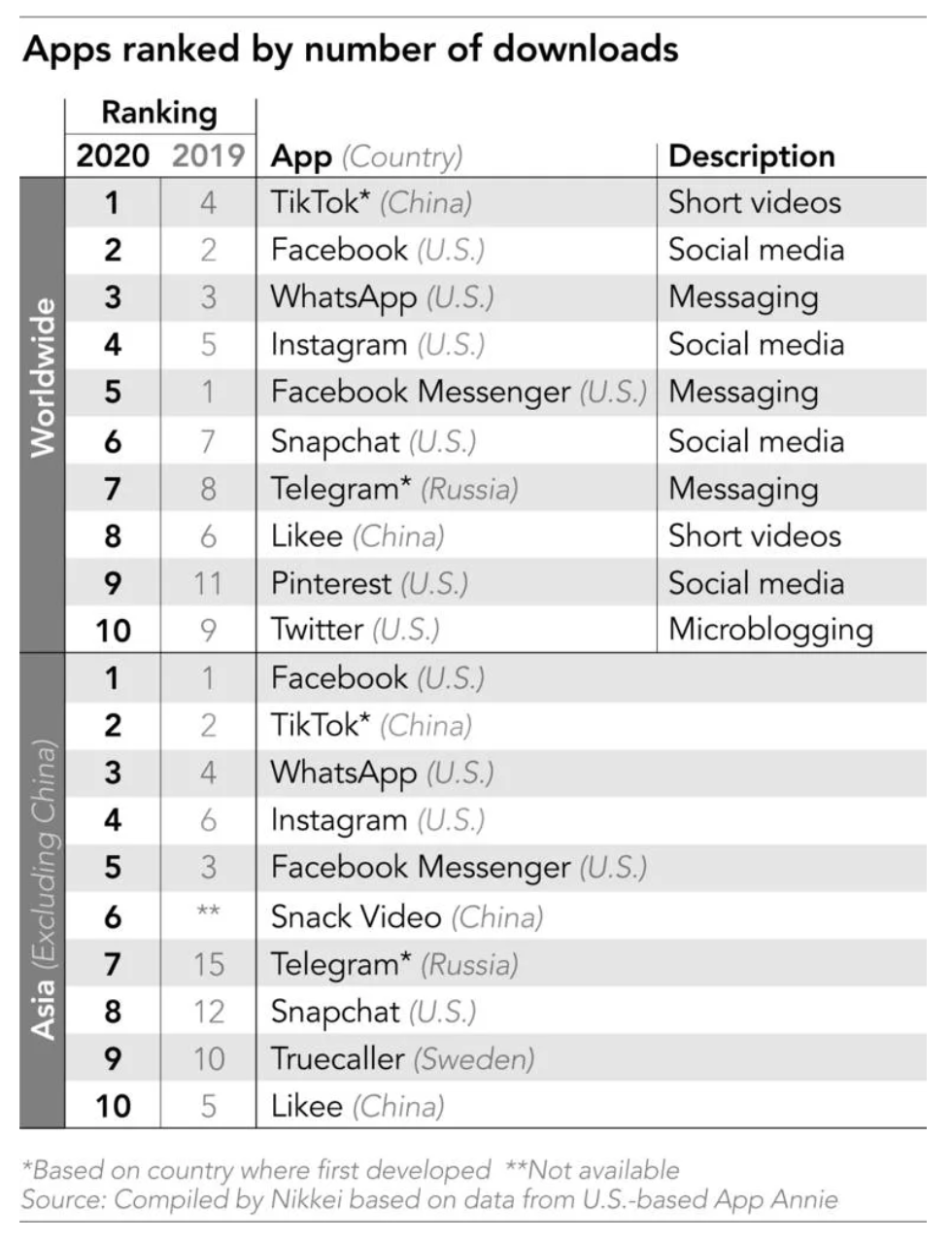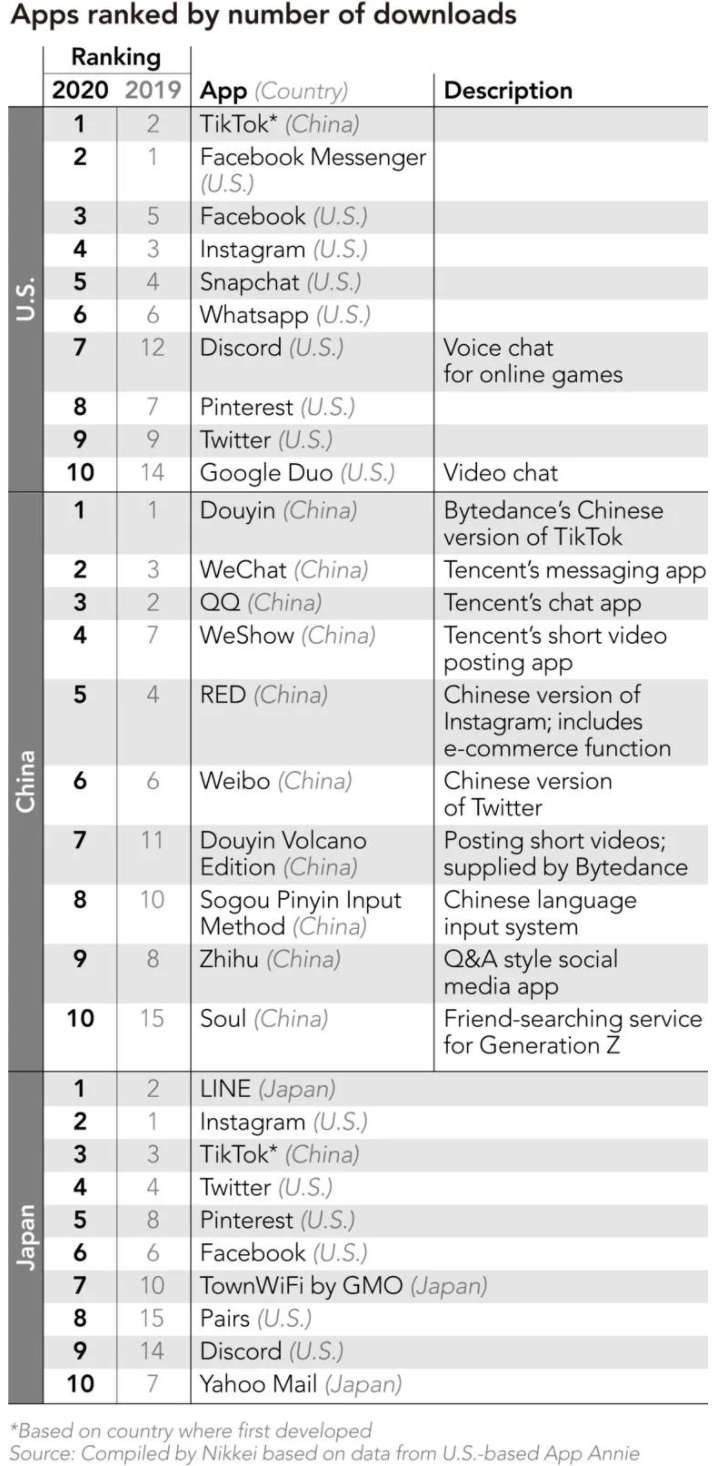A global survey of downloads in 2020 shows that TikTok, a video-sharing app developed in China, tops the list of social media providers for the first time since the study was first conducted in 2018.
As concern for personal privacy grows, Telegram, a messaging app that can delete posts, also ranked high during a year when social media use has been driven up by the COVID-19 pandemic.
ByteDance launched the international version of TikTok in 2017, and has since overtaken Facebook, WhatsApp, Instagram, and Facebook messenger—all of which are Facebook owned—in downloads, even in the US.
“I enjoy videos by artists who aren’t performing live anymore because of the pandemic,” said Nina, 37, of Portland in the US.

Some believe that personal information shared with TikTok is not secure. In 2020, former President Donald Trump called on the company to sell off its US operations or be banned. The app’s popularity nevertheless grew during the pandemic, when it became the leading download in Europe, South America, and the US.
Joe Biden, Trump’s successor, has withdrawn the presidential executive order, but uncertainties remain elsewhere. China’s Likee, TikTok’s competitor, creates short videos that many companies use for marketing, and it ranked eighth in the latest global download league.
At the start of 2021, WhatsApp announced that it would share messaging data with Facebook relating to interactions between users and companies. Although WhatsApp promised to protect infomation about communications between friends and family, some users moved over to other apps.
Bucking that trend, Telegram, a messaging app originally developed in Russia but now based in Germany, moved up to seventh place. Users can adjust the settings to delete messages automatically after a specified period. The app was a particular hit with protesters in Hong Kong and Thailand who wanted to operate under the state radar.
Users have previously been mostly guided by the convenience and ease of use of free social media, but privacy has become more of a concern lately. “Companies’ approach to handling data will become a deciding factor in consumer choices,” Shinichi Yamaguchi, an associate professor at the Center for Global Communications, told Nikkei.
Discord, a voice calling app, has moved up to seventh place, has benefited from people’s need to isolate during the pandemic, The app is popular among gamers for chatting when online, and has been funded by Sony Group. Social media services have primed the pump for greater investment and corporate involvement.
Domestic apps dominate the China market where many from overseas are closed out. Three in the top ten are for short video posts, including Douyin, the predecessor of TikTok, which ByteDance still provides in China.
Douyin is popular for music, dancing, and general entertainment content. Douyin Volcano Edition—also from ByteDance—provides videos from everyday life, including people falling down in the street and other mishaps.
Tencent’s WeShow focuses on video games, and includes celebrities playing games live.

Among the newcomers, Little Red Book (RED) was fifth most downloaded. It combines social networking with e-commerce, mainly cosmetics, fashion, diet goods, and similar consumer goods. In China, word of mouth is important, especially among women. “I read reviews of cosmetics and other products every day,” said a female user in Beijing.
Online networking is particularly popular among Generation Z, born in the late 1990s onwards. Soul, the number ten app, uses artificial intelligence to analyze users’ personalities through psychological tests. It then matches them with other people with similar profiles. A major difference from traditional matchmaking services is that people are not selected based on a picture of their face. Consumers use the app for matchmaking or simply to find new friends.
Short videos have gained popularity in other parts of Asia. Snack Video, an app from China’s Kuaishou, was the sixth most downloaded in Asia-Pacific. Its strength is live commerce—a combination of video broadcasting and online shopping. Companies have used it to grow sales during the COVID-19 pandemic.
Line, which is especially popular in Thailand, was pushed out of the rankings by strong competition from new players. But in Japan, it moved from number two to the top spot. The company is working to make Line a super app by enhancing its payment settlement function.
During the pandemic, Osaka prefectural authorities used Line for vaccine reservations, and it is widely used by other local governments to disseminate information. It is increasingly a piece of daily life’s infrastructure. However, a subcontractor in China was discovered to be able to view Japanese user data, and security has become an issue.
The US matchmaking app Pairs was originally developed in Japan, where it rose to eighth place. With the pandemic ongoing, it has a remote dating function that was added in April 2020 to enable people to maintain romantic links from home. “I started using the service because I couldn’t have any real encounters with people during the pandemic,” said one male office worker in his twenties.
“The total viewing time for TikTok in the US and UK is longer than that for YouTube, and short videos will continue to attract attention,” Chuzen Kin, marketing manager at App Annie, told Nikkei as he reviewed trends. “In terms of content, music and comedies are becoming more popular.” Vocal social media is also on the up, with Clubhouse taking off in Japan and the US in early 2021.
This article first appeared on Nikkei Asia. It’s republished here as part of 36Kr’s ongoing partnership with Nikkei.
